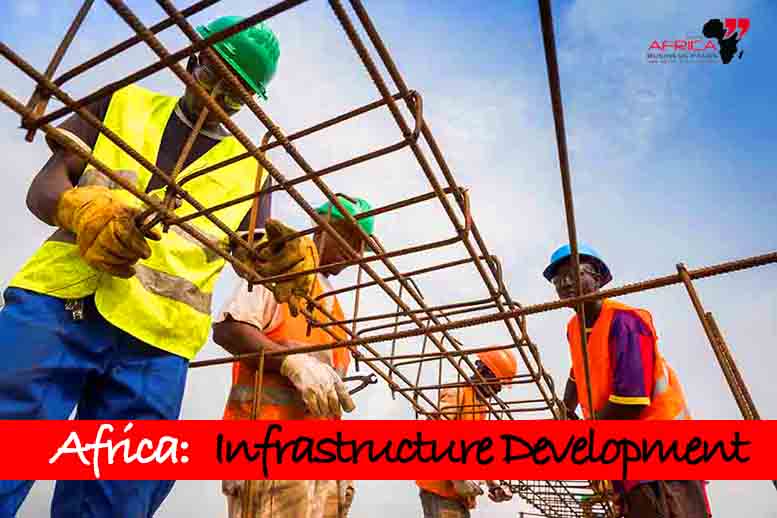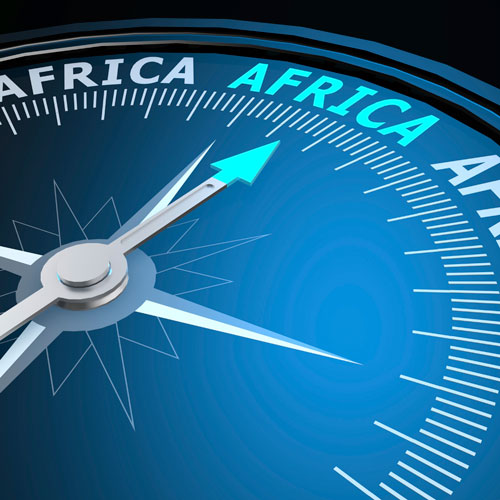Rexel Steel Furniture
Manufacturer of quality steel furniture in Dubai - Steel Desks, Steel Filing Cabinets, Steel Cupboards, Steel Lockers, Steel School Furniture etc...

Only one in three Africans has access to electricity, compared to nine of 10 people elsewhere in the developing world. Estimates are that the African continent loses two per centage points of GDP growth annually as a result of its infrastructure deficit.18 But massive change is under way. Multiple national and pan-African projects have been completed or are in the pipeline such as building and upgrading highways, railways, ports, power plants, and water stations. China and the African Union launched an ambitious plan to develop road, rail, and air transport routes to link capitals across Africa.
 African Union chief Nkosazana Dlamini-Zuma
praised the proposal as “the most substantive project the AU has ever signed with a
partner.” While China has been the champion of in-frastructure investment in Africa,
other players such as Brazil, India, Japan, and the United States have begun to emerge
as major partners on the continent.
African Union chief Nkosazana Dlamini-Zuma
praised the proposal as “the most substantive project the AU has ever signed with a
partner.” While China has been the champion of in-frastructure investment in Africa,
other players such as Brazil, India, Japan, and the United States have begun to emerge
as major partners on the continent.
The US government’s “Power Africa” project has committed to adding more than 30,000 megawatts of power capacity in Sub-Saharan Africa. In addition, the Infrastructure Consortium for Africa is investing nearly $20 billion in energy, transport, water, and sanitation infrastructure, including $8 billion from private-sector investment.
While it is still far behind most of the world, African connectivity has exploded over the past decade. Internationaland pan-African telecommunication operators have invested in information and communication technology (ICT) infrastructure to improve connectivityand cut costs for both operators and end users.
The region now boasts nearly 10 per cent of the world’sInternet users, and more than one-fourth of thecontinent’s population have Internet access. Alongwith Internet access, Africa has also seen tremendousgrowth in access to mobile technology. The GSM Association reports that Sub-Saharan Africa has 329 millionunique subscribers and will become the fastest-growing region, with a compound annual growth rate of 7 per cent through 2020.26 In the same period, overall penetration is expected to increase to 79 per cent, with smartphone connections increasing to over 1.5 billion by 2025. As high-speed Internet becomes more prominent and the cost of smartphones and tablets declines, the better ICT infrastructure and access to technology can further transform the way people and businesses function across the region.
With little landline infrastructure, mobile technology quickly became the first choice
for phone communication in many African countries. The technologyinflation rate dropped
from 10 per cent to 4 per cent in the same period. Inflation is difficult to predict,
and rates in an emerging market can be exacerbated by political instability or lack of
economic diversity, but many African governments appear to be developing the right
policies to manage inflation risk and keep high inflation at bay.
Political stability is still a concern in some African countries, but gains are being made. Investors cite political instability as one of the biggest short-term threats to growth in Africa. Many African countries are in transition to more democratically stable states.
Previously, African government leaders hesitated to commit to longer-term projects—such as infrastructure and housing construction—whereas many now feel more comfortable with planning further ahead because they do not fear being ousted immediately. Vester also noted a documented correlation between political stability and long-term economic progress. He pointed to Kenya, Ghana, Botswana, and Zambia as countries that will benefit from continued political stability:
“Factors like that will give [these countries] a serious lift off, where they can enjoy
20 years of trend growth of around 6 to 7 per cent.” After Tunisia’s popular uprising in
2011 and a steady transition to democracy in 2014, investors regained confidence and
sought to participate actively in Tunisia’s economy. Rebranding itself as “a democratic
start-up,” the government continues to support the implementation of reforms and
sustainable economic development. Nigeria, Africa’s largest economy, is the most recent
example of improved stability with a peaceful transfer of power between civilian
governments.
 Most African countries have mechanisms to guarantee the repatriation
of profits and capital gains. Being able to transfer business profits to the home
company from abroad is a key factor for investing in any emerging market. However, under
what portion of the tax code the gain qualifies and the amount a company or investor
will pay in taxes can vary significantly across the different countries. According to
KPMG, some countries have separate capital gains tax rates prescribed in the revenue
code, such as Kenya with 5 per cent, Nigeria with 10 per cent, and Ghana with 15 per
cent.
Most African countries have mechanisms to guarantee the repatriation
of profits and capital gains. Being able to transfer business profits to the home
company from abroad is a key factor for investing in any emerging market. However, under
what portion of the tax code the gain qualifies and the amount a company or investor
will pay in taxes can vary significantly across the different countries. According to
KPMG, some countries have separate capital gains tax rates prescribed in the revenue
code, such as Kenya with 5 per cent, Nigeria with 10 per cent, and Ghana with 15 per
cent.
Other countries like Senegal and Uganda tax capital gains at the corporate tax rate, 30
per cent in both countries. Uganda and others also make an exemption for profits of a
local subsidiary being returned to the parent company abroad. In Uganda these are taxed
at a lower rate than the corporate tax rate. South Africa’s approach to capital gains
appears to be unique on the continent—66.6 per cent of capital gains are taxed at the
corporate rate of 28 per cent. Taxation on dividends among the countries profiled by
KPMG is much lower and seems to operate within a tighter band of rates. Ghana, Kenya,
Nigeria, Senegal, and Uganda claim between 8 to 15 per cent as a tax, with some
exceptions for double tax treaties with certain countries.
Average corporate tax rates are higher than in other emerging markets but may come with better exemptions and other incentives. According to KPMG the maximum corporate tax rates for the 21 reporting African countries ranged from 19 to 35 per cent, remaining the same or declining from the previous year. Across the countries surveyed, the average corporate tax rate is about 27.9 per cent, above the 23.6 per cent global average but below the maximum 35 per cent US corporate tax rate. However, despite the comparatively higher rates, many African countries offer tax incentives for particular industries or to achieve development goals such as promoting investment in rural areas or providing training to local people.
Continued development of the overall financial system will assist companies in seeking capital and provide exit opportunities for investments. US and European banks such as Standard Chartered, Barclays, and Citibank have operated in Africa for decades.
In addition, there are 15 domestic pan-African banks with total assets of more than $15 billion. Standard Bank, based in South Africa, is the biggest by asset size in this group, posting over $160 billion, with operations in 19 African countries and 11 others globally. Ecobank, headquartered in Togo, has the most expansive footprint in Africa, with branch operations in 35 countries.
South Africa has 12 separate tax and other incentive programs to promote trade, export, and investment in the country. One such program, the 12I Tax Allowance Incentive, provides the equivalent of approximately $30 to $75 million in tax allowances for projects in the manufacturing sector. After the program was announced in 2010, about 50 projects worth approximately $3.8 billion were approved in eight sectors with the chemical, cement and ceramics, and agro-processing industries leading the way. Nigeria has 69 designated “pioneer” industries ranging from integrated dairy production and tourism to consumer product manufacturing and real estate development, which receive seven-year tax holidays. Additional tax allowances and other incentives are offered to established companies thatinvest in economically disadvantaged areas, promote exports, or create in-house training facilities.
Currently, 26 stock exchanges operate on the African continent, including a regional exchange for eight West African countries, the Bourse Régionale des Valeurs Mobilières (BRVM), and a new exchange that opened in 2015 in Somalia.
The Johannesburg Stock Exchange is ranked in the top 20 largest exchanges in the world and dwarfs the other exchanges in Africa with capitalization of over $1 trillion.
The African Development Bank’s African Financial Markets Initiative is focusing on strengthening and diversifying the financial systems across Africa, including the development of bond, commodity, and foreign exchange markets, and reinforcing commercial banks and clearing houses. This will give companies in smaller countries access to public markets and help tackle the issues of low capitalization and illiquidity of current exchanges.
Regionally integrated markets are also an important vehicle for supporting the growth of financial markets across the continent, and work is being done to ensure consistency in legal and accounting practices.
Previous NextManufacturer of quality steel furniture in Dubai - Steel Desks, Steel Filing Cabinets, Steel Cupboards, Steel Lockers, Steel School Furniture etc...
New Al Dhaid Furniture L.L.C. (NAD) offers a comprehensive range of home and office furniture and has emerged as a leading exporter to the African markets...
Ajmals has produced a special line of perfumes for the African markets. MARYAJ, a special range of budget-priced perfumes has already become popular with African customers...
Specialised supplier of kitchen equipment for hotels, restaurants and cafés. Seeking importers of kitchen equipment in Africa and buyers in African markets...
Everhot STAINLESS STEEL Water Heaters are much better than the conventional glass-lined water heaters as their inner tank is made from stainless steel...
Full range of Truck Chasis for all uses as well as standard and luxury buses and forklifts from 1 to 7 tons, with diesel, gasoline, LPG and battery operating systems...
One-stop source for all tractor and diesel engine parts in Dubai. Seeks business partners and wholesalers in Africa to further increase its client base in Africa...
Manufacturer of all kinds of plastic, paper and packaging materials. Seeks importers in Africa of packaging materials as well as cleaning chemicals...
Manufacturers of Fire Extinguishers, Fire Fighting Equipment and related products and equipment. Wholesale inquiries from Africa welcome. Distributors wanted...
Asimco is a leading manufacturer of premium friction products including brake pads, brake shoes, fuel pumps, brake fluids, disc rotors and shock absorbers...
Tyres, tubes and batteries. Largest stockist of Chinese, Indian and Indonesian Tyres, Korean Tubes and Batteries and a leading exporter of tyres to Africa from Dubai...
Complete range of automobile spare parts, tyres, batteries and lubricants available for the tough, demanding driving conditions of Africa. A-MAP is one of the leading exporters of automobile spare...
Complete range of automobile spare parts, tyres, batteries and lubricants available for the tough, demanding driving conditions of Africa. A-MAP is one of the leading exporters of automobile spare...
Exedy Middle East FZCO manufactures a complete range of clutch and transmission solutions for a wide range of automobiles and machinery. Exedy clutches are in high demand in Africa...
Gifts, Novelties and Promotional Material supplier. Watches, Bags, Key Chains, Desktop accessories, Pen Sets, Gift Items... Wanted business partners in Africa...
Competitively priced tyres of almost all well known brands like Advance, Double Happiness, GT, Double Ox, Hankook etc. BBG Trading is a major exporter to African markets...
Distributor for Scania in the United Arab Emirates since 1981, has been registering a healthy growth in demand for genuine spare parts for trucks, buses and marine and industrial engines
Spare parts for all kinds of heavy machinery and equipment. Represents Hyster, Grove, Bobcat, Perkins, Massey Ferguson, Deves, Ausa, Sullair...
Manufacturer of quality soaps, cosmetics and toiletries for international markets and a leading exporter of beauty products and toiletries to Africa...
Manufacturer of quality steel furniture in Dubai - Steel Desks, Steel Filing Cabinets, Steel Cupboards, Steel Lockers, Steel School Furniture etc...
New Al Dhaid Furniture L.L.C. (NAD) offers a comprehensive range of home and office furniture and has emerged as a leading exporter to the African markets...
Ajmals has produced a special line of perfumes for the African markets. MARYAJ, a special range of budget-priced perfumes has already become popular with African customers...
Specialised supplier of kitchen equipment for hotels, restaurants and cafés. Seeking importers of kitchen equipment in Africa and buyers in African markets...
Everhot STAINLESS STEEL Water Heaters are much better than the conventional glass-lined water heaters as their inner tank is made from stainless steel...
Full range of Truck Chasis for all uses as well as standard and luxury buses and forklifts from 1 to 7 tons, with diesel, gasoline, LPG and battery operating systems...
One-stop source for all tractor and diesel engine parts in Dubai. Seeks business partners and wholesalers in Africa to further increase its client base in Africa...
Manufacturer of all kinds of plastic, paper and packaging materials. Seeks importers in Africa of packaging materials as well as cleaning chemicals...
Manufacturers of Fire Extinguishers, Fire Fighting Equipment and related products and equipment. Wholesale inquiries from Africa welcome. Distributors wanted...
Asimco is a leading manufacturer of premium friction products including brake pads, brake shoes, fuel pumps, brake fluids, disc rotors and shock absorbers...
Tyres, tubes and batteries. Largest stockist of Chinese, Indian and Indonesian Tyres, Korean Tubes and Batteries and a leading exporter of tyres to Africa from Dubai...
Complete range of automobile spare parts, tyres, batteries and lubricants available for the tough, demanding driving conditions of Africa. A-MAP is one of the leading exporters of automobile spare...
Complete range of automobile spare parts, tyres, batteries and lubricants available for the tough, demanding driving conditions of Africa. A-MAP is one of the leading exporters of automobile spare...
Exedy Middle East FZCO manufactures a complete range of clutch and transmission solutions for a wide range of automobiles and machinery. Exedy clutches are in high demand in Africa...
Gifts, Novelties and Promotional Material supplier. Watches, Bags, Key Chains, Desktop accessories, Pen Sets, Gift Items... Wanted business partners in Africa...
Competitively priced tyres of almost all well known brands like Advance, Double Happiness, GT, Double Ox, Hankook etc. BBG Trading is a major exporter to African markets...
Distributor for Scania in the United Arab Emirates since 1981, has been registering a healthy growth in demand for genuine spare parts for trucks, buses and marine and industrial engines
Spare parts for all kinds of heavy machinery and equipment. Represents Hyster, Grove, Bobcat, Perkins, Massey Ferguson, Deves, Ausa, Sullair...
Manufacturer of quality soaps, cosmetics and toiletries for international markets and a leading exporter of beauty products and toiletries to Africa...
Manufacturer of quality steel furniture in Dubai - Steel Desks, Steel Filing Cabinets, Steel Cupboards, Steel Lockers, Steel School Furniture etc...

